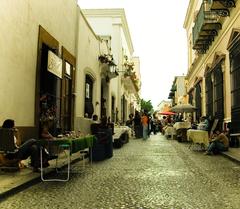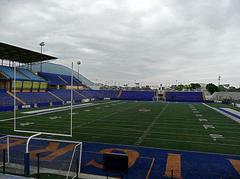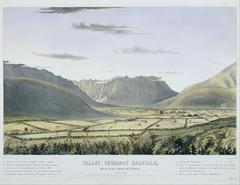
Tecnológico Stadium Visiting Hours, Tickets, and Monterrey Historical Sites Guide
Date: 03/07/2025
Introduction: The Enduring Legacy of Estadio Tecnológico
Estadio Tecnológico, once a keystone of Monterrey’s sporting and cultural landscape, remains deeply embedded in the city’s collective memory. Inaugurated on July 17, 1950, as part of the Instituto Tecnológico y de Estudios Superiores de Monterrey (ITESM) campus, the stadium was conceived to foster student athletics, local sports, and community engagement. Designed by architect Federico Velasco, it stood as an exemplar of modernist architecture and community spirit, initially accommodating 19,000 spectators and ultimately expanding to over 36,000 seats (Nomada News; Estadios de Futbol).
For 67 years, Estadio Tecnológico served as the home of the Borregos Salvajes American football team and Club de Fútbol Monterrey (Rayados), hosting major milestones such as matches in the 1986 FIFA World Cup and over 40 editions of the Clásico Regio derby. The stadium’s vibrant atmosphere and multifunctional role in concerts and community gatherings cemented its place as a symbol of civic pride and regional identity (Fútbol Mexicano Wiki; FMF).
Though demolished in 2017 as part of the Distrito Tec redevelopment, the legacy of Estadio Tecnológico is celebrated through commemorative spaces, digital archives, and Monterrey’s ongoing passion for sport and culture. This comprehensive guide details the stadium’s history, cultural significance, practical visitor information, transportation tips, and nearby attractions, offering a meaningful connection to Monterrey’s vibrant heritage (ONCE Diario; Interpcan).
Contents
- Origins and Construction
- Architectural Evolution and Expansions
- Sporting and Cultural Milestones
- Decline, Closure, and Redevelopment
- Legacy and Remembrance
- Visiting Today: Distrito Tec and Estadio Borregos
- Travel Tips and Nearby Attractions
- Frequently Asked Questions (FAQ)
- Summary and Visitor Recommendations
- Sources
Origins and Construction
Announced in 1946 and inaugurated on July 17, 1950, Estadio Tecnológico was established to meet the growing need for a dedicated venue for ITESM student athletics (Nomada News). The stadium’s modernist design, led by Federico Velasco, combined functionality and aesthetic appeal, receiving international acclaim and the “World Architect” award in 1973 (Football Tripper).
Architectural Evolution and Expansions
Throughout its lifespan, the stadium underwent several key renovations:
- 1965: Addition of the “tribuna volada” (overhanging stand) to improve sightlines and increase capacity.
- 1986: Major expansion for the FIFA World Cup, including the “herradura” (horseshoe-shaped) stand, boosting capacity to over 36,000 (Estadios de Futbol).
- Continuous Upgrades: Enhanced lighting, locker rooms, and press facilities kept Estadio Tecnológico at the forefront of Mexican sports venues.
Sporting and Cultural Milestones
Football and American Football
- Home to Borregos Salvajes: The university’s American football team was the first resident, setting the stage for decades of collegiate sports (Fútbol Mexicano Wiki).
- C.F. Monterrey (Rayados): From 1952 to 2015, Rayados played their most significant matches here, including the club’s ascension to Mexico’s top division in 1956 and multiple league titles (FMF).
- Clásico Regio Derbies: Over 40 editions of Monterrey’s legendary football rivalry between Rayados and Tigres UANL took place in the stadium (Interpcan).
- International Events: Hosted matches in the 1983 FIFA World Youth Championship and the 1986 FIFA World Cup, elevating both the stadium and Monterrey on the world stage (ONCE Diario).
Beyond Sports
- Concerts and Events: The stadium welcomed renowned artists, large-scale concerts, and community gatherings, further embedding it into the city’s cultural life (FMF).
- Ceremonies and Graduations: Served as the site for university commencement ceremonies and major social events (Conecta Tec).
Decline, Closure, and Redevelopment
By the early 2010s, Estadio Tecnológico’s infrastructure lagged behind modern standards, and the needs of both ITESM and C.F. Monterrey outgrew the venue’s limitations (Wikidata). Plans for the new Estadio BBVA (inaugurated in 2015 with a capacity of 51,000) marked the end of Estadio Tecnológico’s era as a premier football venue (StadiumDB; Wikipedia).
After Rayados played their final match on May 9, 2015, the stadium continued hosting university events until its closure and ceremonial farewell in April 2017. Demolition began in June 2017 to make way for a new campus vision, including the construction of Estadio Borregos and expansion of green spaces as part of the Distrito Tec initiative (Conecta Tec).
Legacy and Remembrance
Despite its physical absence, Estadio Tecnológico’s spirit endures through commemorative plaques, digital archives, and oral histories shared by alumni and fans. The site now features Estadio Borregos, a modern facility for American football and soccer with a capacity of 10,000, continuing the tradition of athletic excellence on the ITESM campus (Wikipedia).
The stadium’s story is a testament to Monterrey’s evolution, balancing tradition and innovation, and serves as a touchstone for community pride and sporting achievement (Nomada News).
Visiting Today: Distrito Tec and Estadio Borregos
Current Status
The original Estadio Tecnológico no longer exists. In its place, Estadio Borregos and new campus facilities stand as part of the ITESM’s redevelopment plan.
Visiting Hours and Tickets
- Estadio Borregos and ITESM Campus: Usually open to the public from 8:00 AM to 8:00 PM, but hours may vary according to event schedules (ITESM Borregos website).
- Event Tickets: Required for football matches and special events; purchase via the ITESM Borregos website or at the venue. There are no general admission tickets for casual visits.
How to Visit
- Location: Inside the ITESM campus, southern Monterrey.
- Access: Reachable via taxi, rideshare, or public transportation. The “Eugenio Garza Sada” station on Monterrey’s Metro Line 1 is the nearest stop (Stadium Guide).
- Campus Entry: Public access policies may vary, especially outside of events; check with ITESM ahead of your visit.
What to See
- Estadio Borregos: Attend a university football match or public event.
- Commemorative Spaces: Seek out plaques and displays honoring Estadio Tecnológico’s history.
- Campus Walks: The campus features landscaped gardens and contemporary architecture, perfect for leisure walks.
Travel Tips and Nearby Attractions
Nearby Attractions
- Parque Fundidora: Urban park with museums, trails, and cultural venues (Wide World Trips).
- Macroplaza: One of the world’s largest city squares, home to monuments and museums (Wide World Trips).
- Cerro de la Silla: Iconic mountain for hiking and city views (PlanetWare).
Getting There
- By Metro: Use “Eugenio Garza Sada” station on Line 1.
- By Taxi/Rideshare: Widely available throughout Monterrey.
- Parking: Limited on-campus parking, especially during events.
Amenities
- Food & Drink: Food stalls and campus cafes operate during events.
- Restrooms: Available within the stadium and campus facilities.
- Accessibility: Estadio Borregos is equipped with ramps and accessible seating.
Safety
- Monterrey is generally safe for tourists, particularly in university and central areas (Reddit). Standard precautions are advised.
Visitor Essentials
- Wear comfortable shoes, bring sun protection, and carry a water bottle.
- Arrive early on event days.
- Respect campus rules and student activities.
Accommodation
- Hotels are available in the Tec district and downtown Monterrey.
- Reserve ahead for major events (The Tourist Checklist).
Frequently Asked Questions (FAQ)
Q: Can I visit the original Estadio Tecnológico?
A: No, the stadium was demolished in 2017. Visitors can experience its legacy through Estadio Borregos and commemorative spaces on the ITESM campus.
Q: What are Estadio Borregos’ visiting hours?
A: Typically 8:00 AM to 8:00 PM, but check ITESM’s website for updates.
Q: How do I buy tickets for events?
A: Purchase tickets online at the ITESM Borregos website or at the venue.
Q: Are there guided tours?
A: No regular tours, but ITESM’s visitor center can provide information about special access or group visits.
Q: Is the stadium accessible for visitors with disabilities?
A: Yes, Estadio Borregos includes ramps and accessible seating.
Q: What else can I see nearby?
A: Explore Macroplaza, Parque Fundidora, Barrio Antiguo, and Cerro de la Silla.
Summary and Visitor Recommendations
Although Estadio Tecnológico is gone, its impact on Monterrey’s sporting and community identity remains profound. The stadium’s history—from hosting legendary football matches and global events to serving as a cultural venue—mirrors Monterrey’s growth and dynamism. Today, visitors can engage with this legacy through Estadio Borregos, campus walks, and commemorative displays within the Distrito Tec redevelopment (Conecta Tec; Wikipedia).
For a deeper connection to Monterrey’s heritage, explore nearby attractions, attend campus events, and participate in exhibitions or guided tours when available. Digital archives and local museums offer further opportunities to celebrate Estadio Tecnológico’s role in shaping the city’s vibrant culture (Nomada News; FMF).
Download the Audiala app for the latest event schedules, ticketing, and exclusive guided tours. Stay connected through Monterrey’s cultural channels for updates and insider tips.
Visual Gallery
- Estadio Borregos exterior with ITESM campus backdrop
Alt text: Estadio Borregos at ITESM campus, Monterrey, modern stadium with blue seating - Historic photograph of Estadio Tecnológico during a packed football match
Alt text: Estadio Tecnológico full stadium during a Clásico Regio match in Monterrey - ITESM campus landscape near Estadio Borregos
Alt text: Green landscaped walkways at ITESM campus near Estadio Borregos
Explore More About Monterrey
Sources
- Nomada News: Estadio Tecnológico Monterrey - History, Visiting Hours, Tickets & Nearby Attractions, 2025
- Fútbol Mexicano Wiki: Estadio Tecnológico - Visiting Hours, Tickets, and Cultural History, 2025
- Conecta Tec: Estadio Tecnológico - History, Final Years, Visiting Tips, and Legacy, 2025
- Wikipedia: Tecnológico Stadium Visiting Hours, Tickets, and Tourist Guide in Monterrey, 2025
- Interpcan: Monterrey’s Coliseums - History and Future of Football Stadiums, 2025




